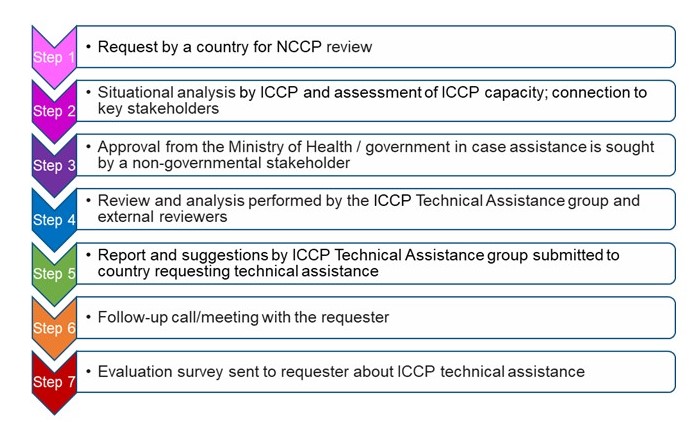TECHNICAL ASSISTANCE OPPORTUNITIES
International Cancer Control Partnership (ICCP) provides various types of collaborative technical assistance support for countries around the development, implementation, and monitoring and evaluation of national cancer control plans (NCCPs).
What technical assistance does ICCP offer?
- Assistance with development of NCCPs and implementation plans
- Reviewing, evaluating, providing feedback on drafts of national cancer control plans (using Oar et al. 2019 and Romero, Trapani et al. 2018)
- Assistance with updating expired or soon-to-expire NCCPs
- Expertise and/or connection to an expert on a specific area of cancer control, for example: pathology
- ICCP ECHO program on NCCP implementation
What ICCP does not offer?
- Financial support
- Drafting a complete NCCP
- Endorsement of the NCCP
Technical Assistance Process for NCCP guidance and review
The process for exploring Technical Assistance with ICCP is described here

How to request technical assistance:
Countries seeking technical assistance can contact the ICCP Technical Assistance Working Group at [email protected] to begin discussing country needs and availability of corresponding expertise through the ICCP.
The International Cancer Control Partnership (ICCP) ECHO Program
The International Cancer Control Partnership (ICCP) ECHO Program seeks to support national cancer control plan implementation through development of a virtual community of practice using the Project ECHO technology-enabled collaborative learning model. The ICCP ECHO Program convenes countries in the implementation stage of their national cancer control plan, bringing together country-level participants and global cancer control experts in a bi-directional learning environment through monthly hour-long ECHO sessions. The curriculum focuses on topics identified by participants as key areas of technical need in cancer control plan implementation:
- Improving data collection and use of data for NCCP implementation
- National coordination of cancer control efforts and partners
- Importance of costing, financing, and allocating for NCCPs
- Mobilizing the healthcare workforce
- Use of data for monitoring, evaluation, and research
- Improving service delivery, implementing system changes
- Resource mobilization and allocation
For additional information about Program content, see the ICCP ECHO program materials. Each session includes a case presentation by one of the participating countries, a didactic presentation by an expert on a technical topic, and a group discussion. The ICCP ECHO Program launched in October 2020 and accepts applications on an annual basis.
The 2024 ICCP ECHO
The call for applications for 2024 is now closed. The next call for applications for 2025 will open in late 2024.
You are welcome to contact the ICCP Technical Assistance for guidance on National Cancer Control Plan development and implementation, or other cancer control-related questions.
Questions/inquiries about the ICCP ECHO for NCCP Implementation: Mishka Kohli Cira, [email protected].
ICCP ECHO Program materials
2024 ICCP ECHO Program Materials (session slides and recordings) - current cohort
2022 - 2023 ICCP ECHO Program Materials (session slides and recordings) - previous cohort
2021 - 2022 ICCP ECHO Program Materials (session slides and recordings) - previous cohort
2020 - 2021 ICCP ECHO Program Materials (session slides and recordings) - previous cohort
Additional technical assistance resources
- Resources (such as publications, guides, tools) available through the ICCP portal covering the cancer continuum
- Repository of publicly available NCCPs and NCD plans from various countries
- An Assessment Tool developed by ICCP partners provides countries with an opportunity to assess their own efforts in developing a plan of action and is meant to engage key stakeholders in a thoughtful discussion of the essential elements of developing and implementing a country’s national cancer control plan.
- The Cancer Control Planning Master Course, comprised of eight webinars led by international subject matter experts, includes the step-by-step process of cancer control planning and implementation. The Master Course is for people engaged in cancer control from various disciplines and at different levels. Although the course has ended, the webinars are available on the ICCP portal.
- UICC fellowships offer.
